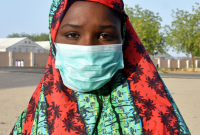Support strong Canadian climate journalism for 2025
Oct. 16 and 17 have been designated by the United Nations (UN) as World Food Day and International Day for the Eradication of Poverty, respectively.
These observances come at a particularly unsettled time in world history, as political, economic and environmental forces collide with the emerging novel coronavirus disease, COVID-19.
The UN World Food Program estimates that, on average, some 700 million people went to bed hungry in 2019. Meanwhile, conflict-ridden nations like Yemen teeter on the brink of mass starvation, while the intersection of war and drought in regions such as the Central Sahel are forcibly displacing tens of thousands as people struggle to stave off hunger.
These figures are from the pre-COVID-19 era.
Likewise, the UN estimates that more than eight per cent of the world’s population lives below the international poverty line, indexed at US$1.90 per day. This percentage has gradually been decreasing over recent years, although not at a rate to meet the UN’s Sustainable Development Goals, which include ending poverty by 2030.
In any event, data now suggests that the rise of COVID-19 has resulted in an increase in global poverty for the first time in years. This is unsurprising, since we have seen the disruptive impact of emerging infectious diseases in the past, and — given the radically altered socio-geographic topography that globalization has fostered — it's something we are sure to see more of in the future.
Food security and poverty are, self-evidently, entwined. They are fuelled by — and, in turn, fuel — conflict, climate change and public health disasters, as we see today with COVID-19, a catastrophe that has a long way to go before it crests.
None of these forces are discrete entities, but instead operate in fluid terrain where each impacts on the other, often not in an additive process but a geometric one, which compounds problems with greater speed, agility and impact. As a result, these issues cannot be addressed in isolation, but require multi-pronged and — importantly — planned, deliberate and novel approaches in solution-finding.
It has become apparent that many of the most powerful governments in the world — the U.S., Russia, India, China and Brazil, to name a few — have actively sought to remove themselves from meaningful responses to the pressing issues of our times. These policies leave those in many parts of the world — including some communities and groups here in Canada — hanging by a thread.
Broad-based supranational organizations like the UN and its subsidiaries (among other notable non-profits worldwide) play an increasingly crucial role in advocating and organizing a cohesive, effective response to these multifarious crises crisscrossed by countless byzantine linkages.
Some corners of the more vile and reactionary regions of the geopolitical swamp have put great effort into dismantling the capacity of international organizations to respond to these monumental disasters. However, it is plain to see that such manoeuvres can only be understood through the lens of power, with little regard for those in most need, those whose existence too often lies utterly vulnerable underneath that mythical Damoclesian sword.
We should not forget that many of these international bodies were formed in the wake of the Second World War and the profoundly fractured landscape of the Cold War. They were identified as a means of mounting a global response to the plight of those who had no access to the gates of the citadels of power.
They remain as prescient today as ever.
For more information on World Food Day and International Day for the Eradication of Poverty, visit www.un.org.






Comments